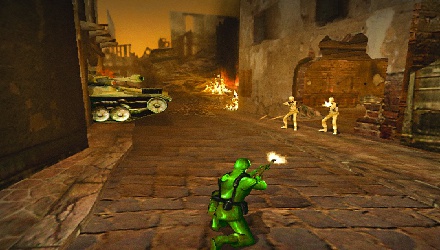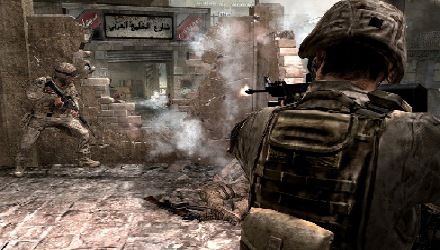Editorials
The Franchise Effect
March 30, 2010, Author: Phil Ubee
My two most played games right now are FIFA 10 and Call of Duty: Modern Warfare 2. These games are part of two of the biggest gaming franchises of modern times, perhaps even ever. I also had FIFA 09 and 08 and the previous two Call of Duty games. In fact, looking through my current collection of Xbox 360 games I can see that ten of the eleven are part of a series or franchise.
It seems it is still a growing trend in the world of video games that developers and publishers alike take what is regarded by many as the easy option. After all, making a new version of FIFA every year, with slightly shinier graphics, new kits and players at their correct club, but adding fairly limited new gameplay features, should cost less in time and money than EA coming up with a totally new game concept, and there is less risk involved as they have an existing fan-base to cater for.
EA are not alone of course. New experiences in video games are few and far between, a look down the sales charts of both the Xbox360 and PS3 lists titles like Mass Effect 2, Bioshock 2, Modern Warfare 2, Forza 3, Uncharted 2: Among Thieves and Aliens vs. Predator. Even the Wii, hailed as an innovative piece of hardware suffers, with franchises like Mario to add to those regular updates to FIFA, Call of Duty and Resident Evil.
So, then the question becomes, do we as consumers force developers to rehash the same old titles year after year with our purchases, or, do the publishers and their marketing teams force our hand by producing them ahead of something new?
Electronic Arts and in particular their EA Sports arm are arguably the biggest culprits/winners/players in this, owning franchises like Madden (1989–yearly), NHL (1991–yearly) and FIFA (1993–yearly). Tiger Woods is a relative newcomer by EA Sports standards only running since 1998 although it is a direct sequel itself from the earlier PGA Tour series which began in 1990 and is also updated yearly. EA also own the franchises for Need for Seed and the Sims, two of the biggest selling franchises around. In fact a look at their upcoming releases would suggest that the company heavily rely on their franchises to continue, with sequels to Battlefield: Bad Company, Command & Conquer, Skate and yet another FIFA all due over the coming months.

The different shades of brown tell you everything!
Most franchises produce one title every year, although the Army men series by 3DO, arguably the worst gaming series ever created, spanned ten years with a whopping twenty-two titles on ten different platforms. This summers World Cup title will make it twenty-four in seventeen years for FIFA (not including the three FIFA Street titles). Need for Speed is just under the average with fourteen titles in its fifteen years and Fight Night, which started in its current form in 2004 has had just three sequels in the subsequent six year period. Nintendo take the cake though, Mario has now, it seems, become so important to games sales that the chubby Italian appears in almost every game released on the Wii and DS. Since 1983 Mario has appeared in a massive 200+ titles covering almost every genre.
A lot of these franchises do produce very good titles, I have bought a fair few of them myself, but do we really need a new one every year when very little changes? In the age of downloadable content could EA Sports not have the biannual World Cup/European Championship game as DLC for FIFA ? Priced at 1200 MP (around £10) instead of a full £40 title? I mean let’s be honest, did anyone really notice the difference between FIFA 08 and the UEFA Euro 2008 title? The developers are happy to give us a squad update around February, could that not be repeated in say late September so the title lasts two years instead of one?
Outside of the sporting arena, releases are separated slightly more. Call of Duty: Modern Warfare 2 came two years after the first (albeit another COD title was released in between). Splinter Cell: Conviction is coming four years after Double Agent. Battlefield: Bad Company 2 and Assassins Creed 2 have given us two years from their predecessors, but does anything really change? Different backgrounds aside, Modern Warfare 2 is very much the same game as Modern Warfare 1. What’s worse is the trend is likely to increase with a suggestion from some developers that they do not do enough with their leading brands. The consensus appears to be that twelve-eighteen months is enough of a gap to avoid any sort of brand fatigue.

Can you tell which one it comes from?
I have spent a bit of time recently with some of the XBOX 360’s biggest sporting franchises and it pains me to say that in most cases it really is money for old rope. 2ksports NBA titles of 2007 and 2009 don’t, in my opinion have a great deal between them. Sure, the newer version looks better, the menu’s and cut-scenes are a good deal more polished, as you’d expect, but they feel almost identical. The NHL 2k series has an almost identikit menu system and uses the same format for cut-scenes as the NBA title, so it seems 2ksports have saved even more in production cost by porting the game engine across both series.
PES is the same with very little between 2008 and 2010 in terms or real innovation, a new game mode here, “improved AI” there, blah de blah de blah.
Having said all this though, there are positives; Final Fantasy is a massive franchise that produces a real experience with each new title. Over the past three years, FIFA has gone from being an average footy title to a world beater with massively improved game physics and new game modes like the 10vs10 online clubs and Be a Pro. Call of Duty 4: Modern Warfare was a massive leap for the series two years ago, it certainly did breathe new life into a franchise that arguably was starting to wobble.
With sales figures showing the likes of Halo 3, COD:MW2, FIFA10, Super Mario Wii and the like often outselling all others, the search for genuine gaming innovation is set to continue for a long time to come. Not only that but we can be safe in the knowledge that if something new does come along that takes the gaming world by storm and sits itself proudly above the afore mentioned franchises atop the sales chart, that a sequel will inevitably follow, whether the original story left room for it or not.
Tagged Call of Duty, Fifa, Games Franchise, Mario, Nintendo, PS3, XBOX360


